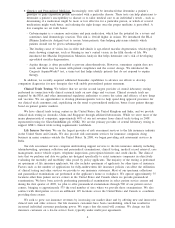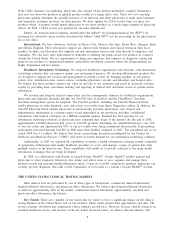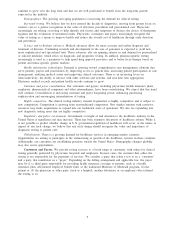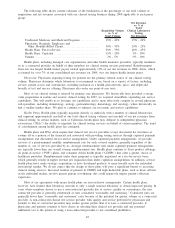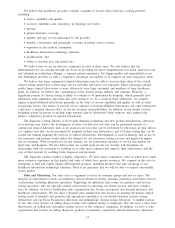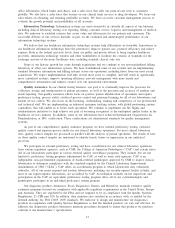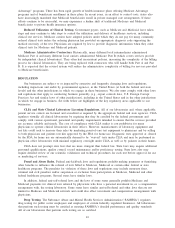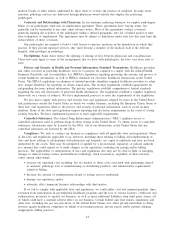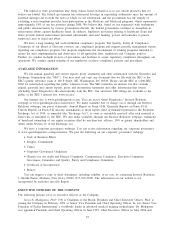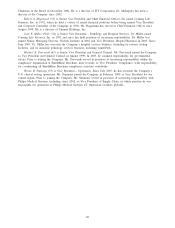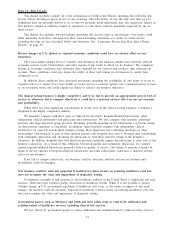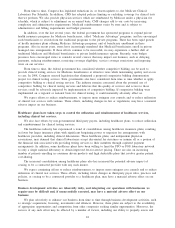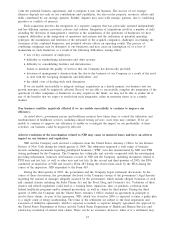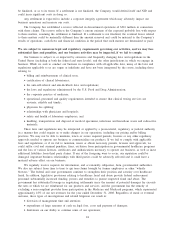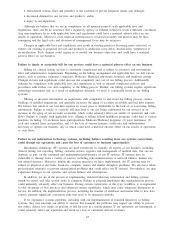Quest Diagnostics 2008 Annual Report Download - page 27
Download and view the complete annual report
Please find page 27 of the 2008 Quest Diagnostics annual report below. You can navigate through the pages in the report by either clicking on the pages listed below, or by using the keyword search tool below to find specific information within the annual report.forfeitures; (3) civil and criminal fines and penalties; and (4) the loss of various licenses, certificates and
authorizations necessary to operate our business. Civil monetary penalties for a wide range of violations may be
assessed on a per violation basis. A parallel civil remedy under the federal False Claims Act provides for
damages on a per violation basis, plus damages of up to three times the amount claimed.
Government Reimbursements. The healthcare industry has experienced significant changes in
reimbursement practices during the past several years. Government payers, such as Medicare and Medicaid, have
taken steps and can be expected to continue to take steps to control the cost, utilization and delivery of
healthcare services, including clinical test services. With regard to the clinical test services performed on behalf
of Medicare beneficiaries, we must bill the Medicare program directly and must accept the carrier’s fee schedule
amount as payment in full. In addition, state Medicaid programs are prohibited from paying more (and in most
instances, pay significantly less) than Medicare. Currently, Medicare does not require the beneficiary to pay a co-
payment for clinical laboratory testing. Certain Medicaid programs require Medicaid recipients to pay co-payment
amounts for clinical laboratory testing. Medicare patients generally are required to make co-payments for
anatomic pathology services.
Federal law contains a Medicare fee schedule payment methodology for clinical testing services performed
for patients covered under Part B of the Medicare program, and a national ceiling on the amount that carriers
could pay under their local Medicare fee schedules. Effective January 1, 2009, the national fee schedule for
clinical testing services was increased 4.5%. Federal law also contains a Medicare fee schedule payment
methodology for pathology and other physician services performed for patients covered under Part B of the
Medicare program. Effective January 1, 2009, the national fee schedule for physician fees was increased 1.1%. If
Medicare fee schedules are reduced, or if independent clinical laboratories are prohibited from billing Medicare
directly for certain services, such as the technical component of pathology services provided to hospitals, it could
have a material adverse effect on our business.
We are generally permitted to bill Medicare beneficiaries directly for statutorily excluded clinical testing
services. An advance beneficiary notice (“ABN”) is a notice signed by the beneficiary which documents the
patient’s informed decision to personally assume financial liability for clinical tests which are likely to be denied
and not reimbursed by Medicare because they are deemed to be not medically necessary (these tests include
limited coverage tests for which the ordering physician did not provide an appropriate diagnosis code and certain
tests ordered on a patient at a frequency greater than covered by Medicare). If a Medicare beneficiary signs an
ABN, we are also generally permitted to bill the beneficiary for clinical tests that Medicare does not cover due
to “medical necessity” limitations. We do not have any direct contact with most of these patients and, in such
cases, cannot control the proper use of the ABN by the physician or the physician’s office staff, who must obtain
the ABN on our behalf. If the ABN is not timely provided to the beneficiary or is not completed properly, we
may end up performing tests that we cannot subsequently bill to the patient if payment is denied by Medicare
due to coverage limitations. CMS has issued manual changes requiring ABNs to include a specific price estimate
for tests covered by ABNs. As a result, incorrectly completed forms could increase, resulting in more invalid
ABNs and more tests that we cannot bill to the patient.
Clinical laboratories that bill Medicare or Medicaid could be excluded from participation in any federal
healthcare programs if it is determined that without good cause they have submitted bills or requests for payment
for items or services substantially in excess of the laboratory’s usual charges for such items or services. The
Department of Health and Human Services Office of Inspector General has periodically proposed to define the
terms “substantially in excess” and “usual charges,” but has not finalized definitions of these terms.
CMS is permitted to adjust statutorily prescribed fees for clinical test services if the standard rules by which
those payments are calculated will result in fees that are “grossly excessive.” CMS rules set forth a process and
factors for establishing a “realistic and equitable” payment amount for clinical test services under Medicare Part
B (and services paid under a prospective payment system) if existing payment amounts are determined to be
inherently unreasonable; payment amounts may be considered unreasonable if they are either grossly excessive or
deficient. Under CMS rules, if CMS or a carrier determines that an overall payment adjustment of less than 15%
is needed to produce a realistic and equitable payment amount, then the payment amount is not considered
“grossly excessive or deficient.” However, if a determination is made that a payment adjustment of 15% or more
is justified, CMS could provide an adjustment of less than 15%, but not more than 15%, in any given year. Fees
payable by Medicare could be reduced prospectively as a result of the application of these rules.
Historically, most Medicare and Medicaid beneficiaries were covered under the traditional Medicare and
Medicaid programs directly administered by the federal government. Over the last several years, the federal
government has sponsored programs to expand private health insurance options for Medicare beneficiaries and has
encouraged such beneficiaries to switch from the traditional programs to the private programs, called “Medicare
15



